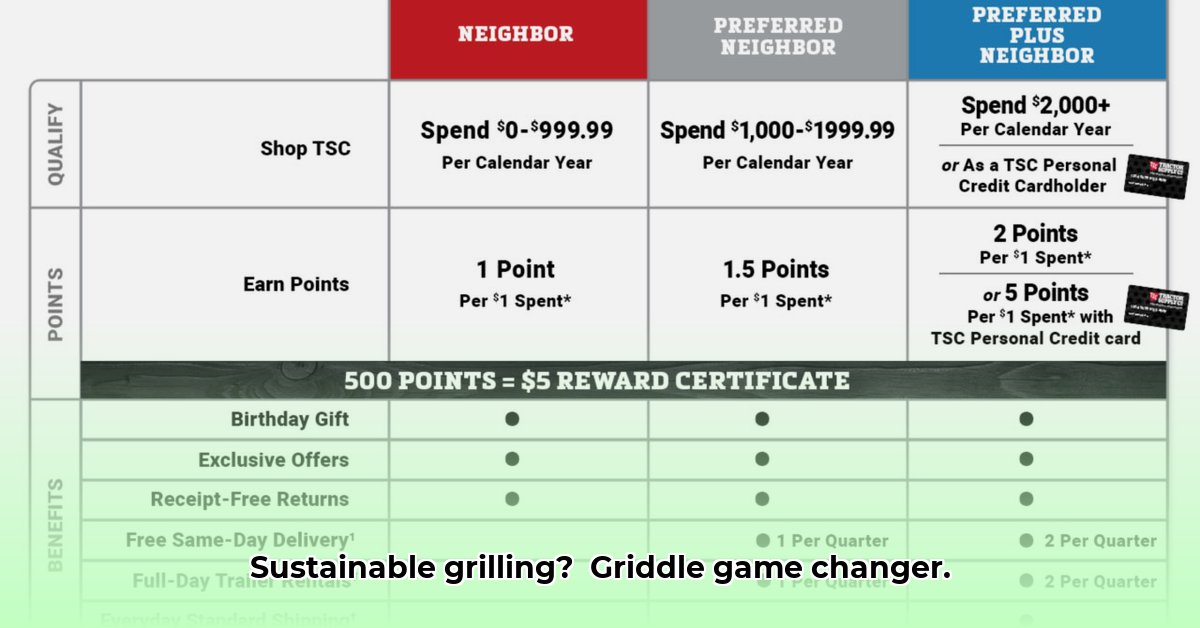
Let's be honest: grilling is fantastic. The aroma of food sizzling on a hot griddle is unbeatable, whether it's burgers, vegetables, or a perfect breakfast. But have you considered the environmental impact of this culinary pleasure? This guide explores how to enjoy delicious grilled food while minimizing your environmental footprint, focusing on choices you can make, starting with your next griddle purchase at Tractor Supply.
The Environmental Footprint of Griddle Grills: From Factory to Backyard
Every product, including your griddle, leaves an environmental mark. The process begins with raw material extraction (often steel or cast iron), which requires energy-intensive mining and smelting. Manufacturing, transportation to the store and your home, and finally, disposal all contribute to the overall impact. A life-cycle assessment (LCA) meticulously analyzes these stages, identifying environmental hotspots.
But what does this mean in practice? Studies show that manufacturing processes, the materials selected, and transportation distances significantly affect a griddle's environmental footprint. For example, choosing a griddle made from recycled materials drastically reduces the demand for newly mined resources, conserving energy and minimizing environmental damage. How can we reduce the environmental impact of outdoor grilling?
Quantifiable Fact: Studies indicate that using recycled materials in griddle manufacturing reduces carbon emissions by an estimated 30-40% compared to using virgin materials.
Rhetorical Question: Considering the environmental impact, wouldn't a more sustainable griddle be a worthwhile investment?
Choosing a More Sustainable Griddle: Smart Shopping for a Greener Grill
Making informed decisions is the foundation of sustainable grilling.
1. Durability for Longevity: Invest in a high-quality, durable griddle. A longer lifespan means fewer replacements, reducing waste and the environmental impact associated with production and disposal.
2. Recycled Materials: Opt for griddles made from recycled metals. This reduces the demand for newly mined resources, saving energy and minimizing environmental harm.
3. Energy Efficiency: Look for griddles with features that minimize energy consumption during cooking, such as superior insulation or precise heat control burners. Smaller griddles, appropriately sized for your needs, also consume less energy.
4. Responsible Disposal: When your griddle's lifespan ends, ensure responsible disposal. Many communities offer scrap metal recycling programs; investigate your local options.
Expert Quote: "Choosing a durable, energy-efficient griddle made from recycled materials is a significant step towards responsible grilling," says Dr. Anya Sharma, Environmental Engineer at the University of California, Berkeley.
Beyond the Griddle: Sustainable Grilling Practices
Sustainable grilling extends beyond the griddle itself.
1. Sustainable Fuel Sources: Explore cleaner fuel alternatives whenever possible. Biogas is a renewable fuel source that produces fewer greenhouse gas emissions compared to propane or charcoal. Consider the fuel’s sourcing too – sustainable charcoal and wood pellets, certified by organizations like the Forest Stewardship Council (FSC), significantly lessen the impact.
2. Reducing Food Waste: Plan your meals carefully to minimize food waste. Grilling presents a great opportunity to creatively utilize leftovers.
3. Community Involvement: Support local initiatives promoting responsible waste management and recycling programs for cooking equipment.
The Future of Sustainable Grilling: Looking Ahead
Significant opportunities exist for innovation and positive change. Manufacturers are developing eco-friendly materials and energy-efficient grill designs. Growing consumer demand for sustainable products is driving market shifts towards greener practices. Government policies, such as carbon emission regulations and incentives for eco-friendly options, will further accelerate this transition.
Actionable Steps: A Roadmap for a Greener Grill
Here's a summary of actionable steps for various stakeholders:
| Stakeholder | Short-Term Actions | Long-Term Actions |
|---|---|---|
| Manufacturers | Conduct LCAs to identify and address environmental problems; source more sustainable materials | Invest in R&D for sustainable materials and designs; establish closed-loop recycling programs |
| Consumers | Purchase durable, energy-efficient griddles; recycle responsibly | Demand transparency from manufacturers; support brands committed to sustainability |
| Agricultural Communities | Explore using agricultural waste as fuel; share griddle repair knowledge | Create community-based repair programs; promote sustainable grilling practices |
| Governments | Offer tax incentives for sustainable materials and manufacturing | Fund research on sustainable grilling technologies; implement robust recycling programs |
Grilling shouldn't compromise the planet’s health. By consciously choosing durable, eco-friendly griddles and adopting sustainable practices, we can all savor delicious grilled food while minimizing our environmental impact. Your next Tractor Supply griddle purchase can contribute to a greener future.